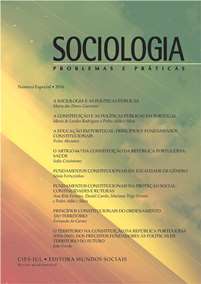Fundamentos constitucionais da igualdade de género
DOI:
https://doi.org/10.7458/SPP2016NE10350Resumo
A Constituição da República de 1976 consagra pela primeira vez no ordenamento constitucional português a igualdade de direitos das mulheres. Este artigo analisa a evolução dos fundamentos constitucionais da igualdade de género ao longo dos 40 anos da Constituição e das suas sete revisões, a partir da literatura e dos debates parlamentares. A rutura com a experiência constitucional anterior, especialmente com a de 1933, e a dimensão transformadora da Constituição saída da revolução estão na base do papel fundamental que esta última teve e tem na promoção da igualdade de género e das políticas públicas desta área. A densificação da vertente da igualdade de género no princípio da igualdade, marcada pela cada vez maior exigência de uma igualdade fáctica e não apenas formal, ilustra e acompanha o percurso dos direitos das mulheres. O estudo deste percurso permite identificar vários pontos para debate e aprofundamento em futuros trabalhos de investigação. Desde logo a influência da participação de Portugal no projeto europeu e em diferentes organizações internacionais, bem como a relevância do papel de distintos atores no processo de construção do texto constitucional em matéria da igualdade de género, com particular destaque para as organizações de mulheres.Downloads
Publicado
2016-12-02
Edição
Secção
Artigos
Licença
Autores que publicam nesta revista concordam com os seguintes termos:
a. Autores conservam os direitos de autor e concedem à revista o direito de primeira publicação, com o trabalho simultaneamente licenciado sob a Licença Creative Commons Attribution que permite a partilha do trabalho com reconhecimento da autoria e publicação inicial nesta revista.
b. Autores têm autorização para assumir contratos adicionais separadamente, para distribuição não-exclusiva da versão do trabalho publicada nesta revista (ex.: publicar em repositório institucional ou como capítulo de livro), com reconhecimento de autoria e publicação inicial nesta revista.


